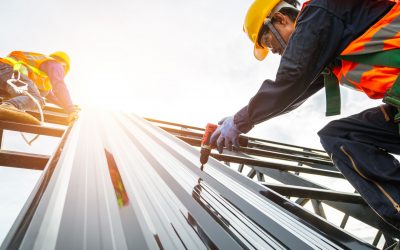When you think of your roof, you probably picture the shingles, tiles, or metal sheets that protect your home from the elements. But have you ever considered what lies beneath those materials? That hidden layer is called the roof deck, and it is one of the most important yet overlooked parts of any roofing system.
In this article, we will break down what a roof deck is, why it matters, the types available, and how it impacts the overall strength of your home or building.
What Is a Roof Deck?
A roof deck is the foundation of your roofing system. It is the layer that sits between the structural framework of your house and the roofing materials you see from the outside. Think of it as the stage on which the rest of your roof performs.
It provide a solid surface for shingles, tiles, or membranes to attach to. They also play a big role in supporting the weight of the roofing system and helping distribute loads like heavy rain, snow, or even foot traffic during maintenance.
Why Roof Decks Are So Important
Your roof deck is not just a supporting character. It affects the durability, safety, and performance of your entire roof. Here is why it matters:
- Structural support – It holds up the roofing materials and keeps them in place.
- Moisture barrier – A well-installed deck helps prevent water from seeping into the structure below.
- Insulation – Certain types of decks add thermal efficiency, helping regulate temperature inside your home.
- Safety – A strong roof deck prevents collapses and helps your home withstand harsh weather.
In short, if the roof deck fails, the whole roofing system is at risk.
Common Types of Roof Decks
Not all roof decks are built the same. The right type often depends on the structure of the home, the climate, and the roofing material being used. Here are the most common ones:
1. Plywood Decking
Plywood is one of the most popular choices. It is lightweight, easy to install, and durable. It is commonly used in residential homes across the United States.
2. Oriented Strand Board (OSB)
OSB is another common material that is slightly more affordable than plywood. It is engineered from layers of wood strands and adhesives, making it strong and cost-effective.
3. Concrete Decking
Concrete roof decks are more common in commercial buildings. They offer excellent durability and fire resistance, but they are much heavier and require a stronger structural foundation.
4. Metal Decking
Made from corrugated steel, metal decking is often used in commercial and industrial settings. It is long-lasting, lightweight, and resistant to pests and mold.
Signs of Roof Deck Problems
Because the roof deck is hidden, many homeowners do not realize there is an issue until it is too late. Watch for these warning signs:
- Sagging roof lines – A clear indicator of weakened support.
- Water stains or leaks – Moisture can seep through a compromised deck.
- Mold or mildew in the attic – A sign of trapped moisture.
- Soft spots when walking on the roof – A weakened or rotting deck.
If you notice any of these, it is best to contact a professional roofing contractor for an inspection.
How a Roof Deck Impacts Roof Replacement
When replacing your roof, the condition of the deck will determine whether it can support new materials. If the roof deck is damaged, it will need repair or replacement before the new roof can be installed. Skipping this step is risky and could cause future problems like leaks, premature wear, or even structural failure.
This is why roof inspections always include a close look at the deck. Investing in a strong roof deck now can save you thousands in costly repairs later.
Caring for Your Roof Deck
While you cannot see your roof deck, you can take steps to protect it:
- Schedule regular roof inspections at least once or twice a year.
- Keep your gutters clean to prevent water buildup.
- Address leaks immediately before they spread to the decking.
- Ensure proper ventilation in your attic to reduce moisture damage.
A little maintenance goes a long way in extending the lifespan of your roof.
Ready to Explore Your Options?
Your roof deck may not get the spotlight like shingles or tiles, but it is the backbone of your roofing system. From providing structural support to keeping your home safe and dry, it plays a critical role in your roof’s performance.
If you want a professional insight, contact Quick Roofing. With years of experience in roof replacement and contracting, our team can help ensure your roof is strong from the deck up. Protect your home by starting with the foundation of a solid roofing system.



